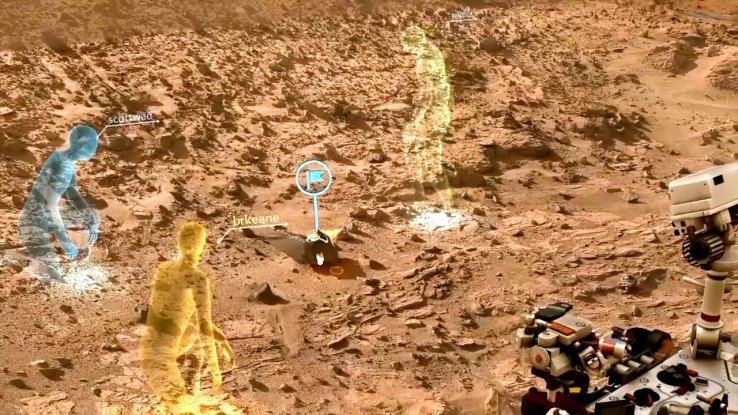
Microsoft and NASA are teaming up to make remote working on the Red Planet a reality, using the newly announced HoloLens headset, and the Windows Holographic technology that it supports. The platform is called OnSight and is being developed out of NASA’s Pasadena-based Jet Propulsion Laboratory (JPL). It uses the Mars Curiosity rover as effectively a telepresence bot for scientists working out of the relative comforts of Earth’s atmosphere.
Data piped from Curiosity will allow the OnSight software to build a 3D simulation of its surroundings on Mars, which scientists will be able to check out first-hand thanks to HoloLens’ ability to project virtual environments onto physical surroundings. The scientists will then be able to examine what’s being worked on by Curiosity from a first-person perspective, and then plan future activities for the rover to complete, as well as see simulations of their likely results.
HoloLens and the holographic computing MS is using with the headset won’t just pipe a 3D recreation of the Martian landscape to scientists. It’ll also overlay the imagery with information, distances, readings and other sensor data and supplemental knowledge to help scientists experience Curiosity’s viewpoint in a way that lets them work within the simulation directly, rather than having to pop out to check some detail on a nearby terminal.
OnSight is part of JPL’s ongoing research into robot-controlled spacecraft and exploration equipment, meaning we could eventually see more robot missions to Mars before we send humans up there to check things out first-hand. Curiosity operations involving the OnSight tech are slated to kick off later this year, and HoloLens and Microsoft’s crazy AR innovations could be included in Mars 2020 rover missions, NASA says.
I literally just finished reading The Martian, so I can’t close without mentioning that this probably would’ve helped a lot with the rescue of Mark Watney, had HoloLens and OnSight existed in that fictional near future.
No comments:
Post a Comment